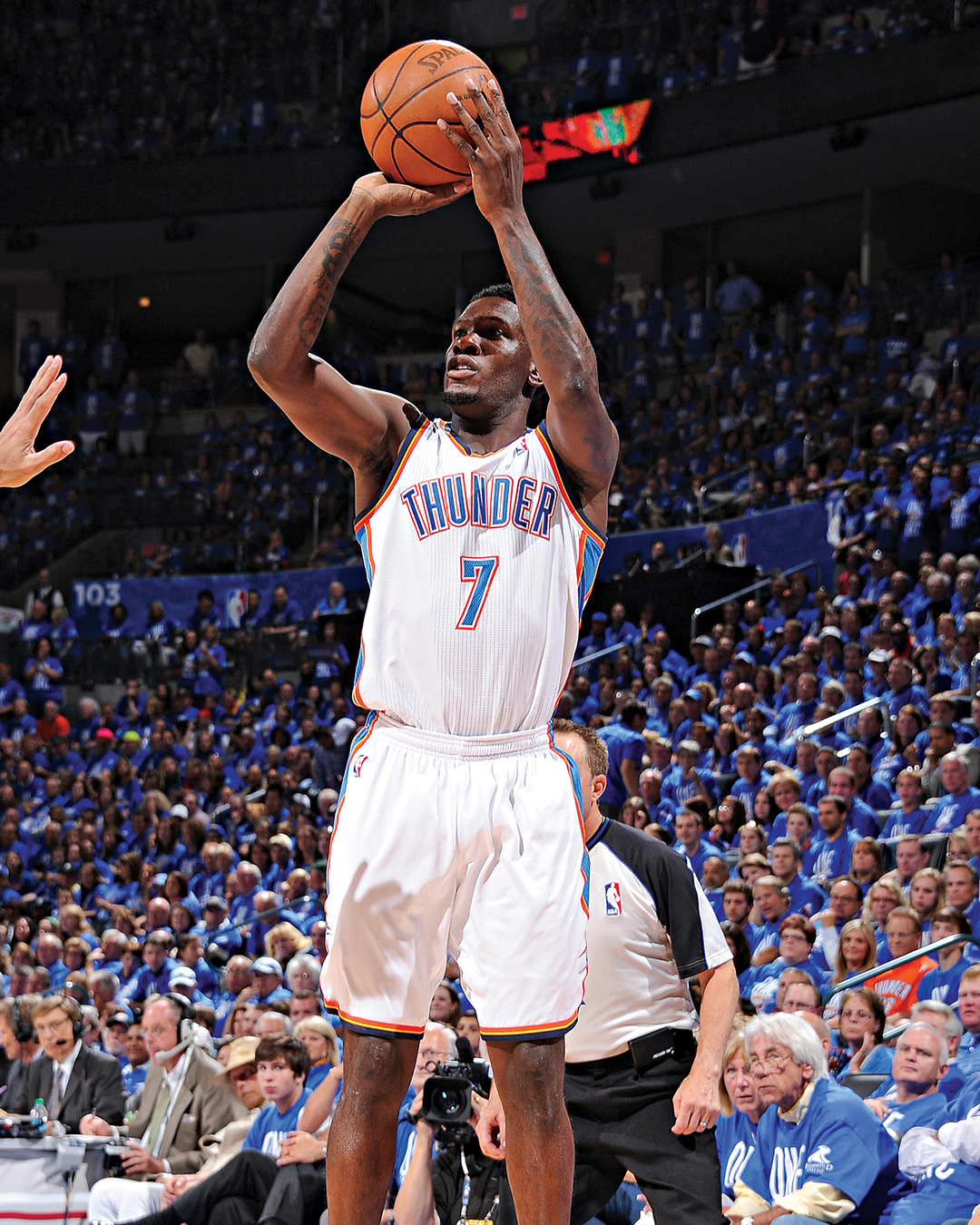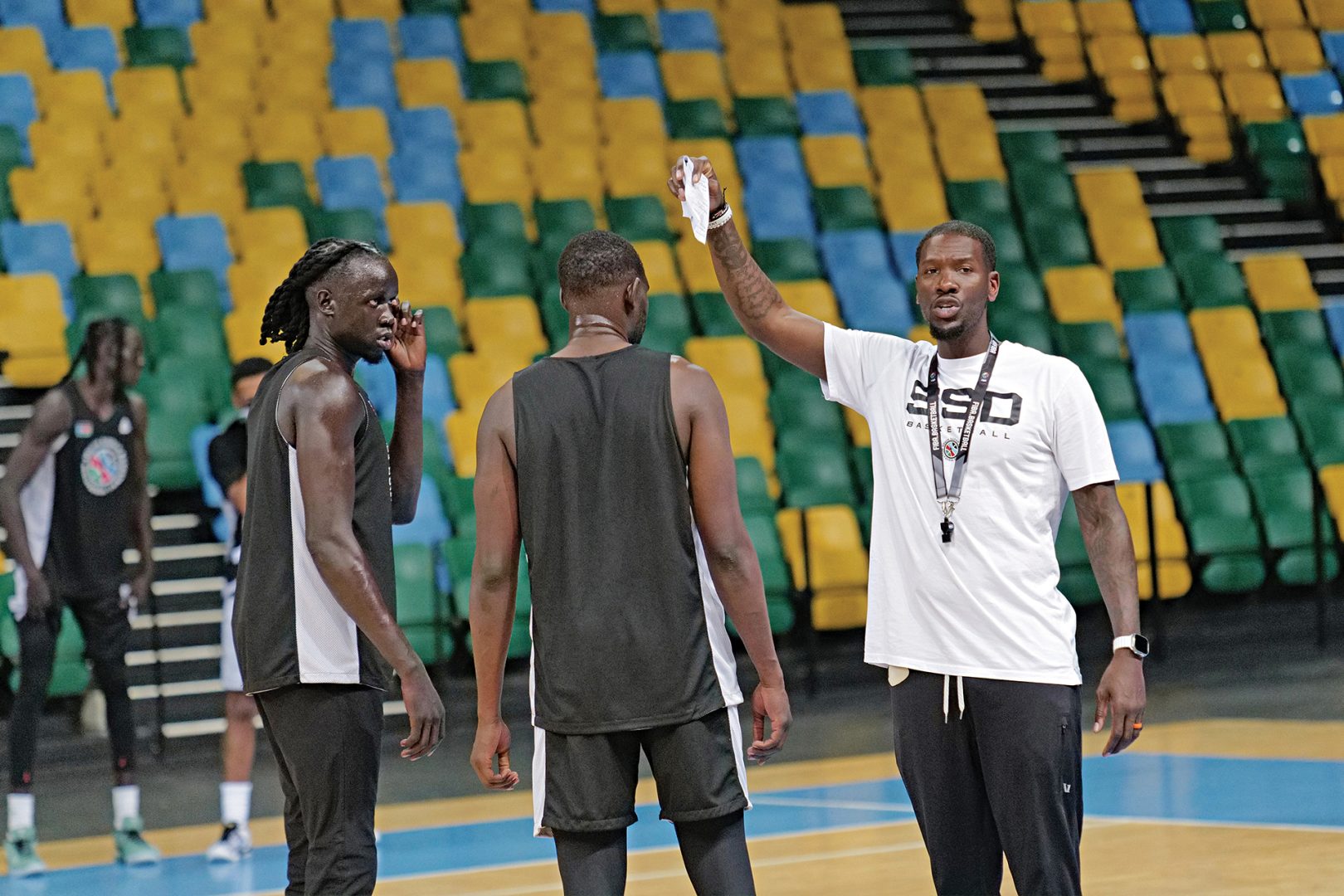Luol Deng and Royal Ivey in the Formation of the South Sudan National Football Team

This story appears in SLAM 251. Buy here.
South Sudan, the smallest country in the world, as I write this, is the proud home of the national basketball team going to the Paris Olympics, a sad achievement for the conflict-ridden nation that has been there since 2011.
Even if this program was led by people who have never heard of SLAM, the success is huge and deserves attention. Alas, it is led by two of our favorite people in the sport, gentlemen who have been bringing smiles to us and all fans of the sport for as long as SLAM has existed: Luol Deng and Royal Ivey.
Deng, who most of you should know from his long NBA career, if not the many amazing steps in his life before or since, is the heart of this story. I learned about Luol around 2000, when his older brother, Ajou, was a highly regarded recruit at UConn and agents started whispering about a younger brother they called “Louie” who would be even better than Ajou. In late 2002, I was hanging out at Blair Academy for a feature on Blair senior Luol and his teammate, Queens legend and future NBA player Charlie Villanueva. Luol was definitely one of the most impressive teenagers I've ever talked to (as if writing about SLAM high school kids wasn't enough exposure, now I have a kid of my own), and he came with an awesome backstory.
Luol, who was born in the southern part of Sudan, a country still plagued by civil war, and his mother and siblings fled the country for a safe life in Egypt in 1990, and in 1994 they reunited with their political father. , Aldo, London. Luol spent some years growing up in the South London neighborhood of Brixton, developing a proper love for Arsenal and football but also playing hooping all the time. And growth. Luol followed in Ajou's footsteps by coming to America to attend prep school, which is how we found him at Blair. And he wasn't just a good kid who played football while getting a good education to secure a college scholarship; he was the second best player in his high school class. In fact, almost every 2003 high school level system or all-star game had a No. 1 and No. 2 player. Luol was the No. 2. No. 1 was LeBron James.
Deng went to Duke for one season, leading the Blue Devils to the Final Four (where they lost by 1 point to Villanueva's UConn team, ironically). Deng was the seventh pick in the '04 Draft and started 10 years with the Bulls with two All-Star appearances, two seasons leading the NBA in minutes per game and a ton of playoff appearances. Most of them were Thibs-Derrick Rose Bulls, and Deng was the engine that got them going. He played five more seasons after Chicago to give himself a structured 15-year career where he was loved by his coaches and team-mates and it's always nice to chat with him in the dressing room (especially when I'm leading Arsenal's team).
Deng wasn't content to be a star on the field, however. In addition, he created the Luol Deng Foundation and regularly returned to London and Africa to participate in various charitable efforts and basketball events designed to promote the game. In 2021, he was appointed an Officer of the Order of the British Empire, which is one of those British things that, at least in Great Britain, means he should be introduced as Luol Deng OBE; becoming “Sir Luol Deng” is possible in the future. At the same time that he was doing his charity work in his adopted home in England, Deng was managing his relationship with his original home of South Sudan. He was appointed as the President of the South Sudan Basketball Federation in 2019 and started spending more time there. “Imagine your family fleeing the country to find life elsewhere,” Deng said in a pamphlet about the SLAM joint Olympic team. “And instead of being in another country and forgetting about South Sudan and enjoying your basketball career, you are actually committing yourself to come back and play for the country you fled because of the war, and you are yourself. now to bring all this good to it. “
Well said, Luol. Unsurprisingly in a country of less than 13 million that has only been around for 13 years—and has been plagued by infighting and development challenges throughout—building a basketball program was not a priority. But there is a legacy of the game there and in the people from there, starting with legendary NBA blocker Manute Bol (who inspired Deng and his brothers in the beginning) and continuing with Deng, former Syracuse star Kueth Duany, son of Manute (and SLAM fave) Bol Bol and heading into the future with young stars like Khaman Maluach , a 17-year-old freshman at Duke who is projected to be a top-five pick in the 2025 NBA Draft.
Since being appointed SSBF president, Deng has restructured the club and sought to find the best players from outside South Sudan who are good for their country of origin. Things came together last summer when South Sudan, playing in the first-ever FIBA World Cup, earned a place in the Olympics by finishing as the top-ranked team in Africa.

If Deng was SSBF's Jerry West—a now-retired legend who built rosters with guile and conviction—Royal Ivey was their Pat Riley, a retired wrestler turned head coach.
Ivey, currently an assistant coach with the Houston Rockets, has been on my radar since 1999, when he led arguably #SLAMfam's favorite high school, Queens' (NY) Cardozo (shout out to Ronnie Z and Coach Naclerio!). to win the NYC PSAL title, he earned MVP honors in a 57-47 win at Madison Square Garden that gave Naclerio, now the winningest coach in New York State public school history, his first title.
After graduating from Cardozo with that '99 title on his resume, Ivey spent a post-grad year at Blair where he played alongside…a young Luol Deng. “Luol has been like a little brother since I met him freshman year at Blair,” Ivey said of Zoom from Kigali, Rwanda, where the South Sudan team is holding a pre-Olympic training camp. “I was older and I wanted to protect him, but he was also an inspiration to me. I was 17 and he was 13, he woke me up at 6 in the morning to go to the gym. Then we were in the same draft class and lived in Chicago and kept in touch. Later, I worked at his camps in London.”
Ivey was a 6-3 2 guard who couldn't shoot well, but he always played hard—especially on defense—and was a great teammate. He played four years at the University of Texas, reaching the '03 Final Four and making such a mark with his intangibles that he was the 37th pick in the '04 NBA Draft despite four years of college averages of 8 points, 3 rebounds and -2. helps with each game.
Ivey's numbers were low even at his best, but he lasted a decade in the League and, after his last game with the Oklahoma City Thunder in 2014, OKC GM Sam Presti asked if Ivey would serve as an assistant on their G team. League, Blue. Ivey has been on the coaching staff ever since.

“The way I got this job was crazy,” Ivey said today. “I was watching Luol's coach [South Sudan] on Instagram. I train in New York. [Then-Knicks head coach David] Fizdale is fired. I was looking for a new opportunity and I was interested in helping Luol move forward. I told him that I would like to be part of the staff. You don't have to be a part, Luol told me. I want you to run this.“
And with that, these two—friends for two decades in the basketball business—were idle, coming out of this pandemic with a fast-paced style of play and the acquisition of many great players. South Sudan has a lot of work to do as a nation, but when the basketball team, nicknamed the Bright Stars, plays and wins, there is a national pride rarely shown. “We are here to put South Sudan on the map,” said Ivey. “We are here to heal. Uniting a country through sports is a life-changing experience. I have come and touched the ground and touched people.”
Deng adds in the booklet: “I want these boys to see that sports are for the country. Sports will be a vehicle for unity.”
Apparently, there's a full-length movie to be made here. I know I will watch it.
Photos via Getty Images.
! function(f, b, e, v, n, t, s) {
if (f.fbq) return;
n = f.fbq = function() {
n.callMethod ?
n.callMethod.apply(n, arguments) : n.queue.push(arguments)
};
if (!f._fbq) f._fbq = n;
n.push = n;
n.loaded = !0;
n.version = ‘2.0’;
n.queue = [];
t = b.createElement(e);
t.async = !0;
t.src = v;
s = b.getElementsByTagName(e)[0];
s.parentNode.insertBefore(t, s)
}(window, document, ‘script’,
‘
fbq(‘init’, ‘166515104100547’);
fbq(‘track’, ‘PageView’);
Source link



